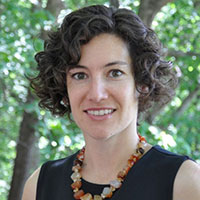Olshan, Desrosiers will use CDC grant to improve understanding of birth defects
December 20, 2023
Two epidemiologists from the University of North Carolina at Chapel Hill’s Gillings School of Global Public Health have received funding to study risk factors for birth defects from the Centers for Disease Control and Prevention’s (CDC’s) National Center on Birth Defects and Developmental Disabilities.

Dr. Tania Desrosiers

Dr. Andrew Olshan
Andrew Olshan, PhD, Barbara Sorenson Hulka Distinguished Professor in Cancer Epidemiology and interim associate dean of research at the Gillings School, and Tania Desrosiers, PhD, associate professor of epidemiology, were awarded a $2.1 million, 3.5-year CDC grant to support the ongoing work of the North Carolina Center for Birth Defects Research and Prevention (NCCBDRP).
The NCCBDRP is one of ten coordinated centers located across the United States that, since 1998, have used CDC funding to increase what we know about birth defects through surveillance, research and interdisciplinary partnerships. After running the National Birth Defects Prevention Study — one of the largest U.S. studies on potential causes of birth defects — from 1997 to 2011, the centers built a robust infrastructure to facilitate more effective birth defects research moving forward.
The follow-on endeavor, called BD-STEPS — the Birth Defects Study To Evaluate Pregnancy exposureS — began in 2014 and makes use of that infrastructure to further examine promising leads about exactly which factors cause a range of birth defects.
The NCBDRP has been continuously funded since 2002 and provides a rich training environment for the next generation of birth defects researchers, including master’s students and doctoral trainees in epidemiology and other disciplines at UNC-Chapel Hill.
As part of the new 2023 grant award, center researchers will carry out the next iteration of BD-STEPS in North Carolina and then pool data with peer centers to maximize the potential for discovery and impact.
These efforts will collect information on 17 types of major structural birth defects that are associated with high infant mortality and morbidity throughout childhood and beyond. As part of the study, researchers will interview parents of babies with birth defects and parents of babies without birth defects and will study environmental, behavioral and genetic causes of birth defects.
As specific risk factors are identified and thoroughly evaluated, the findings then inform clinical and public health interventions meant to reduce the risks and, accordingly, lower rates of birth defects.
“Our goal is to identify risk factors with strong potential for clinical and public health translation,” said Desrosiers, who emphasized that a key ingredient in the team’s research infrastructure is the long-standing partnership with the CDC and other birth defects research centers.
“One of the major benefits of the CDC’s re-investment in the NCCBDRP is that, as a long-standing center, we are able to leverage our highly successful infrastructure toward innovative research objectives that build upon what we’ve learned about the epidemiology of birth defects over the past decade,” she added. “For example, we are excited to delve deeply into how neighborhood environments and social determinants of health impact the risk of having a pregnancy affected with a birth defect. We also are committed to understanding how we can better support children living with a birth defect by investigating factors associated with mortality in early childhood and increased, related risk for other conditions such as childhood cancer.”
Contact the UNC Gillings School of Global Public Health communications team at sphcomm@unc.edu.
